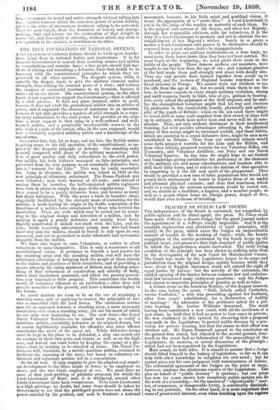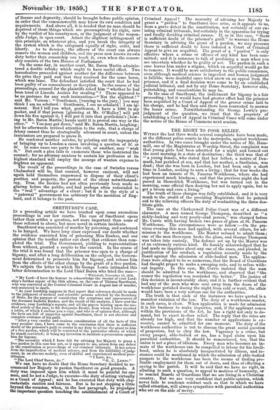PRACTICE OF PUBLIC LAW COURTS.
THE independence of the Bench is sustained, not compelled, by public opinion and its direct agent, the press. No Miles could have made Jeffreys a decent Judge, but the great journal makes the appointment of a Jeffreys simply impossible. And it is the constant explanation and elucidation of legal principles, still mainly in the press, which saves the Judges an impracticable amount of trouble in the teaching of Juries; while the hearty recognition of the service performed by the bench keeps up the judicial heart, and preserves that high standard of public justice in which the Anglo-Saxon stands unrivalled. The truly living condition of the principle has been shown in nothinc,e more than in the development of the new Court for Matrimonial Causes. The Court was made by the Legislature larger in its scope and jurisdiction than the original design, mainly because while they were about it English statesmen could not extend the right of equal justice by halves; but the novelty of the extension, the sudden opening of the barrier between common law and ecclesias- tical law occasioned many unforeseen questions; and the Judges had almost to improvise principles of practice as well as rules. A debate arose on the bench on Monday, of the deepest interest. In the case before the court, "Hall, falsely called. Castleden, versus Castleden," a wife was proceeding against her husband, after four years' cohabitation, for a declaration of nullity of marriage : the advocates of the petitioner asked for a pri- vate hearing. Mr. Justice Williams demurred. The court having been constituted a new court, with all the incidents of a new court, he held that it had no power to hear cases in private. He was confirmed in this opinion by observing that a proposal was made in the Legislature to protect public decency by a pro- vision for private hearing, but that the clause to that effect was stricken out. Mr. Baron Bramwell agreed to the conclusion on the ground first stated, but objected to the second ground, inas- much as the court had no information of the proceedings of the Legislature, its motives, or actual discussion of the principle ; which had not been negatived by the Legislature. Most sound, on both sides. It is absurd to assume that a Judge should blind himself to the history of legislation, so far as it can help with other knowledge to enlighten his own mind ; but he cannot piece out his own judgment with reminiscences of debate. The substantial agreement of the Judges on the point at issue, however, confirms the wholesome resolve of the Legislature. The plea on behalf of "public decency" is specious; but our press has now for years shown how completely public opinion can do the work of a censorship,—for the amount of "objectionable" mat- ter, of coarseness, or disagreeable levity, is continually diminish- ing in our journals. On the other hand, it is most important that oases of great social interest, even when touching upon the regions of licence and depravity, should be brought before public opinion, in order that the commonwealth may know its own condition and requirements. And above all, it is needed that no man should be deprived of those things which are presumptively his right, save by the verdict of his countrymen, or the judgment of the respon- sible Judge, in open court. Admit the slightest infringement of this principle' on whatever plea, and you break the integrity of the system which is the safeguard equally of right, order, and liberty. As to decency, the officers of the court can always remove the women and children, and the press now knows its own duty better than censorship can teach it, even when the censor- ship consists of the two Houses of Parliament.
- On the same day, in another court, Mr. Baron Martin adminis- tered a double rebuke which ought to have useful effect. Two horsedealers proceeded against another for the difference between the price they paid and that they received for the same horse, which was lame. The defendant satisfied the court that he had been omilty of no concealment or deception. In the course of the proceedings, counsel for the plaintiffs asked him "whether he had been tried at Lincoln Assizes for stealing" ? There appeared to be no pretence for any such insinuation—" Not the slightest ! " said Mr. Vernon: "Gentlemen, [turning to the jury,] you may think I am no seholard : Gentlemen, I am no scholard ; I am ig- norant. But I tell you what, gentlemen I have a 100/. in my pocket, and if that person [glancing at kr. O'Malley] will put .down his five against it, I will put it into that gentleman's [bow- ing to Mr. Baron Martin] hands until it is proved one way or the other." "You may get down," said Mr. Baron Martin, laughing; but he afterwards revived attention to the rule, that a charge of felony cannot thus be strategically advanced in court, unless the insinuators are prepared to prove it.
He conferred another service, by pointing out the impropriety of bringing up to London a cause Involving a question of 51. or 6/. In some eases one party to the snit, or another, may "wish it." But such a plea fails to exonerate those who instructed the counsel; for no attorney anxious to sustain his profession at its highest standard will employ the scourge of wanton expense to frighten an opponent. The result of the proceedings in the ease of Swinfen versus Chelmsford will be, that counsel, however eminent, will not again hold themselves empowered to dispose of their client's position and property, the protest of the client notwithstand- ing. True, the licence had not often previously been made so glaring before the public and had perhaps often redounded to the " real " advantage of a client; but it is in the style of a "paternal" government too arbitrary for the meridian of Eng- land, and it belongs to the past.



























 Previous page
Previous page